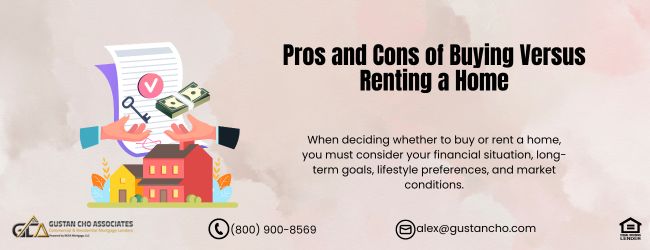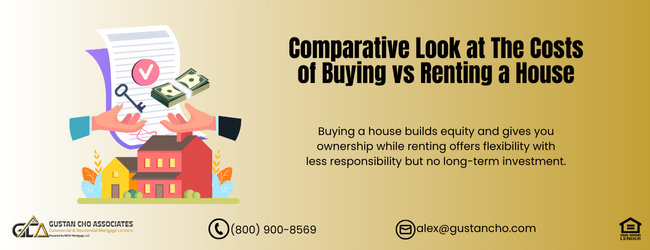Renting versus Buying a Home: What is the Difference?

This guide covers the costs and benefits of renting versus buying a home. Recent studies show that more and more college graduates live at home with their parents and/or rent. Buying their first home is often not a priority for younger Americans. However, once they move out of their parent’s home and are renting and landlords are increasing rents, they seriously consider buying a home. Recent graduates of colleges and technical schools are doing more research on renting versus buying a home. They often realize that renting versus buying can be cheaper. However, renting is an expense versus buying. You accumulate equity when you buy a house. Renting versus buying a home? Buying solves the issue of landlords increasing rents year after year. When thinking about renting versus buying a home, buying a house often makes housing much more affordable. In this guide, we will discuss the great benefits of renting versus buying a home.
Rising Home Prices and Demand for Housing
The housing market is booming throughout the United States. Except for a handful of states, most areas see rising home values. Mortgage rates have been the highest since the 2008 Great Recession. Rising interest rates have not slowed the housing market. Due to rising home prices, FHFA raised conforming loan limits to $776,550 for 2024. HUD, the parent of FHA, raised FHA loan limits for 2024 to $498,257. This is the third year in which both FHFA and HUD increased loan limits. Many homeowners who purchased homes just a few years ago enjoy a hefty equity position.
Renting versus Buying a Home: Housing Market With Low Cost of Living
Some of the hottest housing markets where buyers can purchase affordable homes with low property taxes are the following:
- Indiana
- Kentucky
- Mississippi
- Texas
- Georgia
- Ohio
- Michigan
- Colorado
- Pennsylvania
- Louisiana
- Alabama
- North Carolina
- West Virginia
- Iowa
Median home prices in the above states are $448,650. Depending on the area, rents on a nice sized 2 bedroom/2 bath home/apartment can go for $1,500 to $2,000 plus. Depending on the property taxes, buying a home versus renting may be cheaper. Another note to consider is that homes are still appreciating. There is more demand for homes than in inventory. Although rates have been the highest since the 2008 Great Recession, there is no sign of a housing correction in the near future. Actually, it is the opposite. Home prices are still expected to rise in the coming months and years.
Start Your Process Towards Buying A Home
Apply Online And Get recommendations From Loan Experts
Worst Places To Purchase Homes In 2025
There are many states where homeowners are selling their homes and relocating to other states with lower taxes. New York lost 1.4 million residents due to high state taxes. This includes property taxes, state income taxes, and sales taxes. California lost over one million residents in the past decade due to high home prices, high sales taxes, and high cost of living. The average home price in California is $978,650 compared to the national median home price of $448,650. Here are other states where homeowners are leaving to other states with low taxes and lower cost of living:
- New York
- California
- Massachusetts
- Connecticut
- Washington D.C.
- Rhode Island
- Vermont
Many companies offer remote job opportunities. Today, many home buyers can live in any state they like due to technological advances in the job market. A large percentage of companies allow employees to work out of their homes versus reporting to a local physical location. This enables home buyers to purchase homes in affordable states with a low cost of living.
How Much Does It Cost To Purchase Average Home
All home purchases require a down payment and closing costs. Many first-time homebuyers do not consider purchasing a home. The main reason is that they believe buyers need perfect credit and a 20% down payment This is not the case. Homebuyers can purchase homes with little or no down payment. Most of our homebuyers at GCA Forums Mortgage Group do not have to come up with any closing costs. Most of our borrowers get sellers’ concessions by home sellers to cover most or all of their closing costs. FHA Loans require a 3.5% down payment and allow up to 6% of sellers concessions. VA and USDA do not require any down payment and offer 100% financing. Fannie Mae and Freddie Mac require a 3% to 5% down payment on conventional loans and 3% seller concessions. If borrowers are short of closing costs, lenders can offer lender credit in lieu of higher rates. Down payment can be gifted by family.
Renting versus Buying a Home: Buying a House With Bad Credit
GCA Forums Mortgage Group are experts in helping home buyers with bad credit. Borrowers can qualify for FHA, VA, USDA, Conventional loans after bankruptcy, foreclosure, deed in lieu, short sale after meeting the waiting period requirements. Here are the mandatory waiting period requirements after bankruptcy and housing event:
- FHA and VA loans require a 2-year waiting period after the Chapter 7 bankruptcy discharged date.
- Homebuyers in a current Chapter 13 repayment plan can qualify for VA and FHA loans during the Chapter 13 plan once they complete 12 months of timely payments with trustee approval.
- There is no waiting period after the Chapter 13 discharged date on VA and FHA loans.
- FHA and USDA require 3 years waiting period after foreclosure, deed in lieu of foreclosure, short sale.
- VA requires two years waiting period after foreclosure, a deed in lieu of foreclosure, short sale to qualify for VA loans.
- Fannie Mae and Freddie Mac require four years waiting for a period after Chapter 7 Bankruptcy, Chapter 13 dismissal date, deed in lieu of foreclosure, and/or short sale on conventional loans.
- There is a seven-year waiting period to qualify for conventional loans after foreclosure.
- The two-year waiting period after Chapter 13 Bankruptcy discharge date on conventional loans.
GCA Forums Mortgage Group offers non-QM loans where there is no waiting period to qualify for a mortgage after bankruptcy, foreclosure, short sale, and deed in lieu of foreclosure. Homebuyers who need to qualify for a mortgage with a direct lender with no overlays, please contact us at GCA Forums Mortgage Group at 800-900-8569 or text us for a faster response. Or email us at gcho@gustancho.com.
Apply For Mortgage Loan With Bad Credit Scores
Apply Online And Get recommendations From Loan Experts
Frequently Asked Questions Renting versus Buying a Home
Here’s an elaborate FAQ on Renting vs Buying a House, providing you with facts to help you decide with ease:
FAQs on Renting versus Buying a Home
How Would You Differentiate Between Renting versus Buying?
- Renting: You rent a property from its owner, and in return, the owner gets a monthly fee. In this case, you own nothing but enjoy the benefits of having less to look after.
- Buying involves investing in a property, and now you are the new owner who gets to build equity. However, a higher minimum threshold is usually needed for maintenance and taxes.
What Are The Advantages of Renting versus Buying a Home?
- Flexibility: Selling a property can be quite the headache, but renting offers unprecedented simplicity when relocating quarters.
- Lower Upfront Cost: Avoid the hassle of the down payment because renting requires just the security deposit for the new place.
- Maintenance-Free Living: As a tenant in a rented place, you’re renting out, so you won’t have to look after regular repairs.
- Fixed Expenses: Rent does not have + or—variants, so unlike homes, you do not have the burden of fluctuating prices like property taxes.
What Are The Disadvantages of Renting versus Buying a House?
- No equity: A disadvantage of renting is that you continuously pay the landlord without receiving anything in return, allowing you to profit from your payments through investment.
- Limited Control: When you make a property your home, you get full authority to modify it however you like, but in this type of agreement, you are still bound to a few restrictions.
- Possible Increase in Rent: Renting allows you to avoid overpaying by raising and lowering the rent whenever the landlord wants without notifying you.
- No tax benefits: When a home has a mortgage, the owner can take advantage by receiving tax deductions, but renting a place loses such opportunities.
What’s The Reason for Purchasing a Home?
- Equity Building: The three-way mortgage payment sells equity in the house and gradually creates wealth.
- Stability: Fixed rate mortgage affordably protects against volatile rents.
- Customization: Ability to remodel or change the house as you wish
- Tax Benefits: Mortgage interest is tax-deductible, and property tax may be deductible.
- Investment Potential: The worth of real estate can be appreciated.
What Are The Negatives of Trying to Buy a House?
- High Upfront Costs: A lump sum percentage of home value is required for the down payment, closing cost, auto charges, and house maintenance.
- Less Flexibility: Selling a house is long and expensive, especially if you want to relocate.
- Maintenance Responsibility: Repairs and home maintenance are the homeowner’s concern.
- Market Risk: Shifts in the home market can depreciate property and cause loss of other facets.
Is The Large Lump Sum a Requirement for Home Ownership?
- Down Payment: With most types of property finance in Australia, you must pay a deposit, which generally ranges from 3% to 20% of the property’s purchase price.
- Closing Costs: These can be about 2%—5% of the house’s price and are connected to the acquisition process, such as title insurance, appraisal, and loan origination.
- Home Inspection: An expense sometimes costs $300 – $500 for the inspectors.
If you measure by the price you pay, that seems to be a good question:
- How much does it cost to rent?
- Should all Owning a Home Be Profitable?
It Simply Depends on the Place You Stay and Your Financial Circumstances
- Short-term: Renting is often cheaper than buying if you plan to remain in one location for less than 3-5 years.
- Long Term: Even though buying a house involves quite a large investment initially, the returns can be favorable in the long run as you accumulate equity.
- Look into the prices in your area using a rent vs buy calculator.
What Needs to be Kept in Mind When Choosing Between Renting versus Buying a Home?
- Time Frame: What is the duration of your stay in a certain place?
- Financial Situation: Can you cover the one-off down payment, closing cost, and recurring expenses?
- Lifestyle Considerations: Do you want flexibility in your options, or are you okay with the stability a home offers?
- Mortgage Market: Is there an upward trend in housing prices? Are interest rates low?
- Personal Goals: Are there any long-term financial goals related to being a homeowner that you have set for yourself?
What Difference Does One’s Credit History Make in Renting versus Buying a Home?
- Rent: The landlords will always check your credit, but you will not be required to meet the same high standards about your credit score as you would for a mortgage.
- Buy: Banks will offer you favorable loan terms with better credit, lowering the rate you have to pay monthly for and on the mortgage.
Are There Any Tax Benefits Associated With Renting versus Buying a Home?
- Rent: You do not claim any tax deduction while renting.
- Buy: Housebuyers can write off some mortgage interest they owe, property tax due, and some closing costs claimed, thereby increasing their earnings.
What Should I Do if I Face The Issue of Paying My Mortgage as a Homeowner?
The worst-case scenario would involve your home losing its chance of modernization, your credit score decreasing, and, worst case, your risk of foreclosure. For example, you can refinance your loan, contact an institution that offers loan modification, or sell the house.
Can I Rent The Property That I Buy?
Yes, if your lender allows it. However:
- Primary Residence Loans: These loans may require you to rent the house within not over a couple of years.
- Investment Properties: The interest rates rise for these loans, and more requirements will be met.
How Can Taking a Home Loan Aid Me in The Long Term?
- Building Your Wealth: As you continue to pay off your mortgage on the home, its value also increases, creating equity for you.
- Retirement Asset: Retirement assets are also a great source of financial security for older people who are downsizing or taking out reverse mortgages.
- Community Stability: You will also secure a home for yourself, which will help you feel more attached to your community.
In Your Opinion, What Are The Hazards of Owning Your Own Home?
- Market Fluctuations: The better half is where property values can also rise, and it becomes easy to refinance your mortgage without putting down too many funds.
- Unforeseen Expenditures: All the repairs, maintenance, and taxes on the property will add on expenses.
- Liquidity Issues: If an unavoidable scenario arises, you may lose cash quickly if you need the funds.
What Are The Strong Points of Renting For Younger People or Those in The Beginning Stages of Their Careers?
- Flexibility: Renting is the best option if you change locations for work or other reasons.
- Lower Financial Risk: Renting needs much less initial outlay and lessens the risks of falling real estate values.
- Focus on Savings – The small initial capital expenditure enables potential renters to start saving for their future objectives, including homeownership.
What Costs Must Be Incurred While Owning a Home Compared to Paying Rent?
While renting requires only payment of the full rent, the following expenses must be incurred when you own a home:
- Monthly mortgage payments along with repayment of interest on the principal.
- Owners Property tax
- Homeowner’s Insurance
- Cost of repairing and maintaining the house.
Renting a home allows you to pay only utility bills and basic home costs, while paying a mortgage requires paying several extra expenses related to owning the house.
Are There People For Whom Renting Would Still Be a Viable Option in The Long Term?
Yes, there are various types of people for whom renting would be a viable option in the long term:
- People who want to avoid being tied down to a location for the long haul.
- Individuals with low or volatile earnings potential and savings.
- People who live in a region where rental fees are considerably less than buying a house.
What is The Impact of Inflation on Buying versus Renting a Home?
- Renting: The rates at which homes are rented would inevitably increase, especially for people living in high-demand cities.
- Buying: Inflation uses fixed-rate mortgages for protection, which provide a reliable payment system and financing but have a drawback: insurance and property taxes tend to increase.
Are There Any Options That Blend Renting versus Buying a Home?
Yes, products like rent-to-own contracts allow you to rent a house and eventually own it. This is a great step for someone willing to become a homeowner.
What Patriots Tools Would Make It Easier For Me To Make a Decision?
Rent versus Buy Calculators are amazing. They effectively show how much money will be spent over a long period.
- Credit Watchers: Evaluate your credit score.
- Housing Market Research: Study the economic trends in your locality.
The choice between renting and buying depends on your finances, way of life, and future expectations. Renting provides more freedom and is cheaper, while buying offers security and a chance to accumulate wealth. Prioritize your needs and use the tools available to ensure your decision is optimal.
Start Your Process Towards Buying A Home
Apply Online And Get recommendations From Loan Experts






Responses